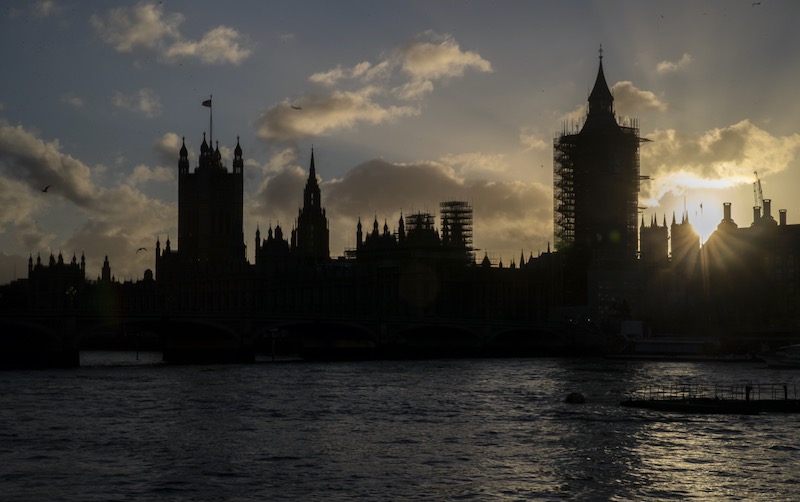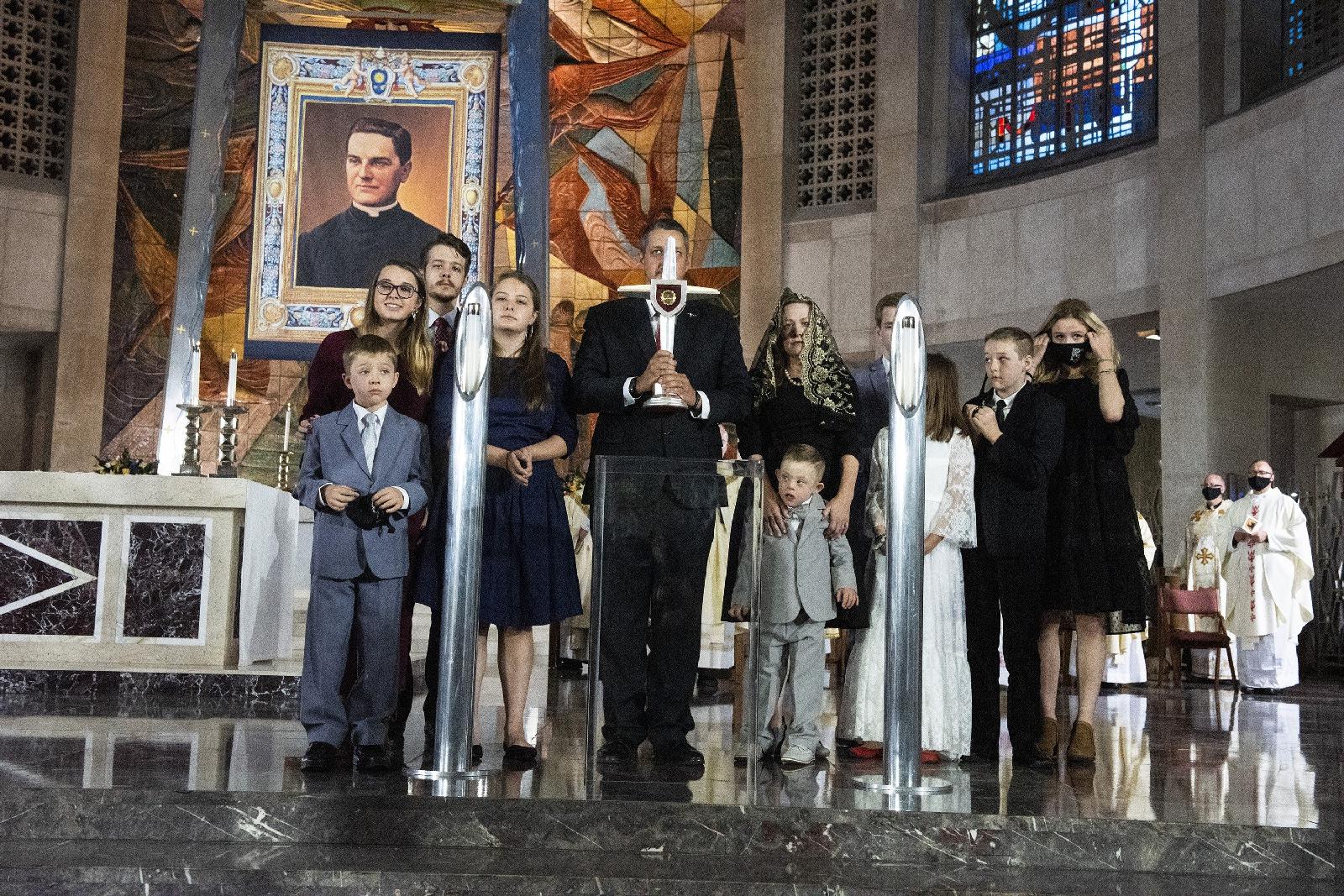
Darkness descends over Parliament at sunset on 1 November, as the nation acclimatises to the coming of a second lockdown.
Han Yan/Xinhua News Agency/PA
Leaders of the Church of England have added their voices to those calling for the government to explain why they have outlawed public worship.
Catholic bishops are calling on worshippers to lobby their MPs to demand the evidence for why the latest lockdown lockout.
Archbishop of Southwark John Wilson has written directly to prime minister Boris Johnson: “I appreciate the heavy burden of responsibility on your shoulders during the Covid 19 pandemic. You have my prayers. I respectfully ask, however, that you provide evidence to substantiate the proposed closure of Catholic Churches.
“We have complied fully with all that has been asked. We have made significant investment in PPE and altered our patterns of public worship to meet the regulations. I represent over 80,000 Mass going Catholics for whom attendance at Sunday Mass is essential. It serves emotional, mental and spiritual well-being and supports some of the most vulnerable in our society. I would ask you please to provide the evidence that Catholic Churches pose such a threat that public worship must be prohibited.”
Archbishop of Westminster Cardinal Vincent Nichols
was among the first to call on government to justify the latest measures.
Now Archbishop Justin Welby, the Archbishop of York Stephen Cottrell and the Bishop of London Dame Sarah Mullally have written a long letter to Church of Engand clergy, explaining that they also will be challenging the government on why certain exemptions have been made and not others. The three most senior clergy in the established Church, they also make clear their disappointment at not being consulted by government.
In the first lockdown, which began in March, the Church of England ordered clergy to shut all churches and forbade even the broadcasting of online services. Catholic priests were permitted by their hierarchy to do online Masses.
In their latest letter, the Anglican leaders appear to acknowledge that shutting churches even to its own clergy, which was not required by government guidelines, might have been a step too far. The position appears to have shifted towards a stance closer to that of the Catholic Church, a significant change of tone given the influence that Eton-educated Archbishop Welby enjoys at the highest levels of government. But this also makes it all the more surprising that he was not consulted before the prime minister's announcement, when churches were not actually mentioned at the press conference but only discovered their fate when it was eventually
published on the government website.
The Anglican leaders say in their
letter: “We are very aware that details are still not clear and there is much discussion still to be had about what the impact of the new lockdown will mean.”
They acknowledge: “We are sure that some of you reading this letter will wish we had made other decisions during the period of the first lockdown, or even challenged the government harder on the decisions it has made. You may be right. However, it is our view that the best way we can serve our nation now is by pouring our energy into doing the things that we can do, which is to pray and to serve.”
They continue: “We are grateful that the new guidelines being introduced on Thursday not only allow churches to remain open for private prayer but also enable online worship to be broadcast from the church building. We were cautious about these issues during the first lockdown – perhaps overly so – but in this second lockdown we want to encourage church buildings to remain open for private prayer wherever possible, making sure that their buildings are Covid secure in the ways that we have learned in recent months, and to broadcast services from their church buildings.”
They say: “However, worship online still means that the people of God do not have access to the sacraments which are so central to our life in Christ. This is a huge loss and since we were not consulted about the lockdown provisions, we fully intend to speak with government about why certain exemptions are made and not others, emphasising the critical role that churches play in every community.
“The sacramental life of the church cannot be seen as an optional extra. Nor can we separate out our worship from our service, it is always both and not either or. Nevertheless, we will of course abide by the law and ask you to do the same. We must do all that we can to keep our communities safe and to enable the NHS to manage this crisis.”
Bishop of Portsmouth Philip Egan has also written direct to the prime minister, expressing his gratitude that churches can remain open for private prayer but also challenging church closures.
“Human beings not only have bodily needs but spiritual needs too and these needs are intimately connected with their mental, psychological and emotional well-being. If grocery shops remain open, why not churches?
“Moreover, for Catholics, churches are not simply ‘places of worship’ where the community gathers. Churches have a deeply religious significance.”
“In July, churches were allowed to reopen for Mass and since then many have returned to Mass. “They write to me to express their great joy at this. Of course, the capacity of our churches has been reduced to make them Covid-safe. The rigorous safety regimes in place require careful social distancing, the wearing of face-masks, sanitisation, oneway systems and the deep cleansing of the building.
“All of this has made attending Mass one of the safest of all activities that people can undertake. This is borne out by the statistics. There is no evidence that attending the liturgy in our churches has contributed to the recent rises in coronavirus cases. I am writing because I earnestly want to ask you to amend the proposed guidance to come in on 5th November, so as to enable our churches to remain open – with all the usual safety regimes - for the Sacred Liturgy.
“In addition, I am writing to all the 34 MPs – 31 of whom are Conservatives – in our diocese to ask them to support this request, when the issue comes before Parliament on Wednesday.”
Bishop of Shrewsbury Mark Davies said: “The Prime Minister mentioned in his statement that he judged it necessary to close much that is judged by the Government as being non-essential in society. We need to be sure that such judgments are based upon clear evidence that, for example, schools, universities and the football premier league will continue as essential elements of our society’s life.
“The Prime Minister made no reference in his statement to public worship so we were astonished to find in national guidance that the Government was seeking the authority of parliament to close all places of worship.
“It is a momentous act for any political authority to seek to ban public worship across a nation.
“No evidence has been offered to justify why the Government seeks to ban public worship that invariably takes place amid some of the most stringent Covid safety measures in the whole of society.
“The vital role which public worship has for the well-being of hundreds of thousands of people in this Shrewsbury Diocese together with faith communities across the nation can never allow public worship to be dismissed as something non-essential.”
He also called for the evidence justifying the ban on public worship to be procued. “We believe that public worship is not part of the problem we face rather it is part of the solution to this deeply human crisis.”
Bishop of Nottingham Patrick McKinney tweeted that he had written to all MPs in his diocese asking them to challenge the ban on public worship. “Faith communities have played a vital role during this pandemic and are key for the spiritual and mental well being of many. I encourage you to do the same.”



 Loading ...
Loading ...